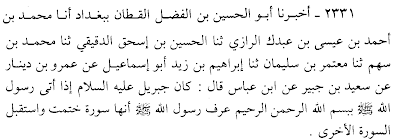وعلى عبده المسيح الموعود
Is Bismillāh al-Raḥmān al-Raḥīm the First Verse of Every Qur’ānic Chapter?
|
Depending on several valid aḥādīth, بِسْمِ اللّٰهِ الرَّحْمٰنِ الرَّحِيْمِ is actually the first verse of every chapter in the Holy Book.
“Qutayba b. Sa‘īd, Aḥmad b. Muḥammad al-Marwazī, and Ibn al-Sarḥ narrated to us; from Sa‘īd b. Jubayr, Qutayba said; from Ḥaḍrat Ibn ‘Abbāsra, he said: The Holy ProphetSAW was not used to know the separation of a chapter until bismillāh al-raḥmān al-raḥīm descended to him.”1
Elaboration: This Prophetic narration belongs to the kind of mursal ṣaḥābī on the authority of Ḥaḍrat Ibn ‘Abbāsra. According to the opinion of the major scholars of uṣūl and fiqh, the value of an original mursal narration, ipso facto, is indeed ḍa‘īf mardūd (weak and rejected). They, however, disagree with each other on whether a religious argument can be based on such narrations or not. There are three opinions with regards to the topic:
1. Ḍa‘īf mardūd
This is held by the majority of the scholars of ḥādīth and fiqh.
2. Ṣaḥīḥ (valid), our argument must be based on it
This is held by Imām Abū Ḥanīfarh, Imām Mālik b. Anasrh, and Imām Aḥmad b. Ḥanbalrh.
3. Acceptable, along with several requirements
This is held by Imām al-Shāfi‘īrh.
Meanwhile, the value of mursal ṣaḥābī, which is clear and well-known, is ṣaḥīḥ (valid), our religious argument must be based on it.2
Scholars have also various opinions while speaking of the office of bismillāh al-raḥmān al-raḥīm. At least, there are two in this case:
1. Bismillāh al-raḥmān al-raḥīm is indeed the first verse of sūra al-fātiḥa and every sūra of the Qur’ān.
This is held by qurrā’ and fuqahā’ of Mecca and Kufa. Among those who hold this opinion are Ḥaḍrat Ibn ‘Abbāsra, Ḥaḍrat Ibn ‘Umarra, Ḥaḍrat Abū Hurayrara, Sa‘īd b. Jubayr, ‘Aṭā’, Ibn al-Mubārak, Imām Aḥmad b. Ḥanbalrh, Isḥāq, Ḥaḍrat ‘Alī b. Abū Ṭālibra, al-Zuhrī, Muḥammad b. Ka‘b, and Sufyān al-Thawrī. This is also a qaul jadīd of Imām al-Shāfi‘īrh.
2. Bismillāh al-raḥmān al-raḥīm is neither a verse of sūra al-fātiḥa nor a verse of any sūra in the Qur’ān. Nevertheless, it is a unique verse descending as both separator and tabarruk for the opening of the recitation of the Qur’ān.
This is held by qurrā’ and fuqahā’ of Medina, Basra, and Syria. Among those who hold this opinion are al-Auzā‘ī, Imām Mālik b. Anasrh, and Imām Abū Ḥanīfarh.3
To my understanding, the divergence of opinion happening here arises from how the scholars grasp up the meaning of فَصْلٌ. The word فَصْلٌ actually does not represent a single separated entity. It is nay meant as authored by the author of Lisān al-‘Arab:
اَلْفَصْلُ الْحَاجِزُ بَيْنَ الشَّيْئَيْنِ.
i.e., فَصْلٌ is ‘the differentiating one between two objects’. It is also said as بَوْنُ مَا بَيْنَ الشَّيْئَيْنِ or ‘an eminence lying between two objects’. A differentiating body and an eminence are in fact two things that should not be treated separately. On the contrary, both of those must be integrated in one object so that the object possesses its own characteristic and singularity. It is next uttered that فَصْلٌ is مَوْضِعُ الْمَفْصَلِ, in other words ‘the place of a joint’. Of course, the place of a joint is a part of that joint itself, e.g. the location where two bones connect. Therefore, it is penned that بَيْنَ كُلِّ فَصْلَيْنِ وَصْلٌ, “There is a connection between every two فَصْلٌ.”4
We know that in every two bones is a joint connecting both of them. For example, hinge joint makes humerus connected to ulna. The same analogy also applies to the case of bismillāh al-raḥmān al-raḥīm. As the hinge joints is the start of ulna and the sign of humerus’ end, bismillāh al-raḥmān al-raḥīm marks the beginning of a new sūra as well as embarks that the sūra beforehand has already terminated. We read in one ḥadīth:
“Abū Ja‘far Muḥammad b. ‘Alī al-Shaybānī informed us in Kufa; Aḥmad b. Ḥāzim al-Ghifārī narrated to us; ‘Alī b. Ḥakīm narrated to us, Mu‘tamir b. Sulaymān narrated to us, from Mathnā b. Ṣabāḥ, from ‘Amrū b. Dīnār, from Sa‘īd b. Jubayr, from Ḥaḍrat Ibn ‘Abbāsra, he said: The Holy ProphetSAW, when Jibrīlas came to him and recited bismillāh al-raḥmān al-raḥīm, got to know that it was a new chapter.”5
“‘Alī b. Ḥujr al-Sa‘dī narrated to us; ‘Alī b. Mushir narrated to us; al-Mukhtār b. Fulful informed us, from Ḥaḍrat Anas b. Mālikra. And Abū Bakr b. Abī Shayba (this redaction belongs to him); ‘Alī b. Mushir narrated to us, from al-Mukhtār b. Fulful, from Ḥaḍrat Anasra, he said: Once upon a day, in front of us, Ḥaḍrat RasūlullāhSAW slumbered in a comfortable manner. Afterward, he raised his head up whilst smiling. We, thus, asked: What did cause you smile, O RasūlullāhSAW? He replied: A sūra was just now descended to me: In the name of Allah, the Gracious, the Merciful. Surely, We have given to thee abundance of good. So pray to thy Lord, and offer sacrifice. Surely, it is thy enemy who is without issue. Afterward, he asked: Do you all know what al-kawthar is? We replied: Allah and His Messenger know more. He said: This is verily a river which my Lord has promised for me. Therein is abundant good. That is a pond which my people will attend in the Day of Judgement. Its cup is the amount of stars. Subsequently, one servant among them will be forced out. I will, therefore, respond: My Lord! Isn’t he among my people? He will, thus, reply: You did not know what happened after your demise.”6
Ḥaḍrat ‘Ā’ishara said:
اِقْرَؤُوْا مَا فِي الْمُصْحَفِ، وَكَانَ النَّبِيُّ صَلَّى اللّٰهُ عَلَيْهِ وَسَلَّمَ لَا يَعْلَمُ انْقِضَاءَ السُوْرَةِ حَتّٰى تَنَزَّلَ عَلَيْهِ بِسْمِ اللّٰهِ الرَّحْمٰنِ الرَّحِيْمِ.
“Recite whatsoever found in the muṣḥaf. The Holy ProphetSAW was not used to know the termination of one sūra until Jibrīlas sent down to him bismillāh al-raḥmān al-raḥīm.”7
“Abū Husayn b. Faḍl al-Qaṭṭān informed us in Baghdad; Muḥammad b. Aḥmad b. ‘Īsā b. ‘Abduk al-Rāzī told us; Ḥusayn b. Isḥaq al-Daqīqī narrated to us; Muḥammad b. Sahm narrated to us; Mu‘tamir b. Sulaymān narrated to us; Ibrāhīm b. Zayd Abū Ismā‘īl narrated to us, from ‘Amrū b. Dīnār, from Sa‘īd b. Jubayr, from Ḥaḍrat Ibn Abbāsra, he said: When Jibrīlas delivered to the Holy ProphetSAW bismillāh al-raḥmān al-raḥīm, he became aware that one sūra got finished and he would receive a new one.”8
‘Allāma al-Āmidī, when he was faced by two question whether bismillāh al-raḥmān al-raḥīm a secluded verse in the beginning of every chapter as a solo or a verse combined together with the beginning parts of every chapter, i.e. included among the chapter, he answered that the second one is the most valid. He then quoted the argument of Imām al-Shāfi‘īrh that the Holy ProphetSAW did not get used to know the beginning and the end of a sūra until Jibrīlas revelaed to him bismillāh al-raḥmān al-raḥīm. That is also what Ḥaḍrat Ibn ‘Abbāsra mentioned. Therefore, he said:
سَرَقَ الشَّيْطَانُ آيَةً مِنَ الْقُرْآنِ لَمَّا تَرَكَ بَعْضُهُمْ بِسْمِ اللّٰهِ الرَّحْمٰنِ الرَّحِيْمِ فِيْ أَوَّلِ السُّوْرَةِ.
“Satan steals one verse (in other narration: the best verse) from the Qur’ān when some people forsake bismillāh al-raḥmān al-raḥīm in the beginning of the chapter.”
According to al-Ghazālīrh, this athar is a proof that basmala is not only for tabarruk.
Basmala was handwritten as per the commandment of the Holy ProphetSAW. No one among his followers denied its inscriptions beside what was recognised to be from him. The Companions were themselves the guardians of the Qur’ān against everything that was not from it.9
Imām Abū Ḥāmid al-Ghazālīrh said:
أَنَّهَا حَيْثُ كُتِبَتْ مَعَ الْقُرْآنِ بِخَطِّ الْقُرْآنِ فَهِيَ مِنَ الْقُرْآنِ.
“As it is written in conjunction with the Qur’ān, with the inscription of the Qur’ān, it is thus from the Qur’ān”.
He later said:
لَوْ لَمْ يَكُنْ مِنَ الْقُرْآنِ لَوَجَبَ عَلَى الرَّسُوْلِ صَلَّى اللّٰهُ عَلَيْهِ وَسَلَّمَ التَّصْرِيْحُ بِأَنَّهُ لَيْسَ مِنَ الْقُرْآنِ وَإِشَاعَةُ ذٰلِكَ عَلٰى وَجْهٍ يَقْطَعُ الشَّكَّ كَمَا فِي التَّعَوُّذِ وَالتَّشَهُّدِ.
“If it were not from the Qur’ān, the proclamation that it was not from there and its propagation in the way that cut off the doubt just as in the case of ta‘awwudh and tashahhud would have been obligated to the the Messenger of AllahSAW.”
If it is argued that the annexation of basmala as a Qur’anic verse is not established, then the answer is: The nonentity of the establishment was built upon related situations when the Holy ProphetSAW dictated basmala to his penmen. The Holy ProphetSAW did not repeat with every word and verse again and again, in the time of his dictation, that basmala was an insertion of the Qur’an. On the contrary, it was his seating for it that basmala was indeed an inscription of the Qur’ān. Related situations really and clearly showed that seating and that seating was definitely known.10
Ibn Ḥazm said:
وَاتَّفَقُوْا أَنَّهُ لَا يُكْتَبُ فِي الْمُصْحَفِ مُتَّصِلًا بِالْقُرْآنِ مَا لَيْسَ مِنَ الْقُرْآنِ.
“The Islamic nation has agreed that whatsoever outside the Qur’ān is not inscribed in muṣḥaf that united with the Qur’ān”.11
For the epilogue, it is nice to quote a quotation of al-Baihaqī:
“The best argument that our scholars propose in supporting bismillāh al-raḥmān al-raḥīm as as a Qur’ānic verse and indeed the opening verse of every chapter apart from al-Barā’a is what we narrated about the Companions’ collection of the Book of Allah in muṣḥaf and they verily inscribed bismillāh al-raḥmān al-raḥīm therein. So, how is it possible for a doubter to doubt that the Companions inscribed 113 verses which were outside of the Qur’ān in those muṣḥaf?”
—000—
—000—
Bibliography
1 Sunan Abī Dāwūd, Kitāb al-Ṣalāh, Bāb al-Jahr bi Bismillāh al-Raḥmān al-Raḥīm, no. 788.
2 Dr. Maḥmūd Ṭaḥḥān, Taysīr Muṣṭalaḥāt al-Ḥadīth (Alexandria: Markaz al-Hudā li al-Dirāsāt, 1415 H), pp. 57-58.
3 Nawwāb Ṣiddīq Ḥasan Khān al-Qanūjī, Fatḥ al-Bayān fī maqāṣid al-qur’ān, vol. 1 (Beirut: al-Maktaba al-‘Aṣriyya, 1992 AD/1412 AH), p. 37.
4 Abū al-Faḍl Jamāl al-Dīn Muḥammad b. Mukarram b. Manẓūr al-Ifrīqī al-Miṣrī, Lisān al-‘Arab, vol. 15 (Beirut: Dar al-Ṣādir, 1300 H), p. 186
5 Al-Mustadrak, Kitāb Tawārīkh al-Mutaqaddimīn min al-Anbiyā’ wa al-Mursalīn, Bāb Dhikr Akhbār Khayr al-Mursalīn, no. 4277
6 Ṣaḥīḥ Muslim, Kitāb al-Ṣalāh, Bāb Ḥujjat Man Qāla al-Basmala Āya min Kull Sūra siwā al-Barā’a, no. 400.
7 Ibn al-Qāṣiḥ al-Baghdādī, Sirāj al-Qāri’ al-Mubtadi’ (Cairo: Maktabat al-Bābī al-Ḥalabī, 1954 AD/1373 AH), p. 28
8 Shu‘ab al-Īmān, Bāb al-Tāsi‘ ‘Ashar min Shu‘ab al-Īmān, Bāb fī Ta‘ẓīm al-Qur’ān, Faṣl fī Ibtidā’ al-Sūra bi al-Tasmiyya siwā Barā’a, no. 2331
9 Sayf al-Dīn ‘Alī b. Muḥammad al-Āmidī, Muntahā al-Sūl min ‘Ilm al-Uṣūl (Beirut: Dār al-Kutub al-‘Ilmiyya, 2003 AD/1424 AH), p. 46
10 Abū Hāmid al-Ghazālīrh, al-Muṣtaṣfā min ‘Ilm al-Uṣūl, vol. 2 (Medina: al-Jāmi‘a al-Islāmiyya Kulliyyat al-Sharī‘a, 1993), pp. 14-15, 18-20
11 Ibn Ḥazm al-Andalusī, Marātib al-Ijmā‘ (Beirut: Dār al-Ifāq al-Jadīda, 1982 AD/1402 AH), p. 195
12 Nawwāb Ṣiddīq Ḥasan Khān al-Qanūjī, op. cit., p. 38.












